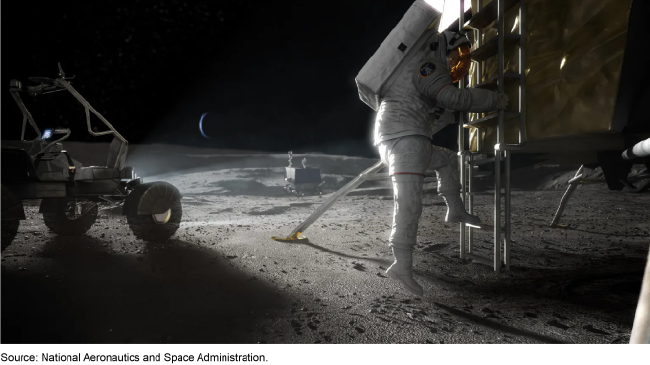NASA Artemis Programs: Lunar Landing Plans Are Progressing but Challenges Remain
Fast Facts
NASA is making progress on its Artemis missions, including Artemis III, which will eventually land humans on the moon for the first time since 1972.
We testified that:
NASA has made progress on its test flights, including launching Artemis I in 2022
Our prior work showed that Artemis III was unlikely to occur in 2025, and NASA recently adjusted the launch date to 2026
NASA hasn't established an official cost estimate for Artemis III, so full mission costs aren't transparent
NASA faces challenges managing its largest projects—including the ones related to the Artemis missions.
Our prior recommendations are to help NASA manage its projects.
Artist’s Rendition of an Astronaut on the Moon

Highlights
What GAO Found
NASA has made progress demonstrating key capabilities needed to support its Artemis missions:
- Artemis I, an uncrewed test flight, successfully launched in November 2022, which demonstrated the initial capability of the Space Launch System and Exploration Ground Systems.
- For Artemis II, the first flight with crew, NASA is currently conducting integration and testing of the crew capsule and the launch pad.
- NASA and its contractors continue to make progress on technologies supporting Artemis III, the first crewed lunar landing mission. For example, the human landing system contractor has conducted two test flights of its human landing system.
Notional Depiction of the Human Landing System

Despite this progress, NASA still faces several challenges:
- Ambitious schedules. In November 2023 (GAO-24-106256), GAO found that the Artemis III lunar landing was unlikely to occur in December 2025, as planned, given delays and remaining technical work. In January 2024, NASA adjusted the launch date to September 2026 to allow contractors time to complete a significant amount of remaining complex work.
- Artemis III mission cost. In December 2019 (GAO-20-68), GAO found that NASA did not plan to establish an official cost estimate for this mission. NASA concurred with a GAO recommendation to establish one but has not yet done so. While NASA requested $6.8 billion to support Artemis III programs in its fiscal year 2024 budget request, decision-makers have limited knowledge into the full scope of Artemis III mission costs.
- Acquisition management. NASA's largest, most complex projects, including those that support the Artemis missions, continue to shape the agency's portfolio. When these projects exceed their cost baselines and require cost reserves to meet their funding needs, it has a cascading effect on other projects. NASA officials are exploring ways to better manage this project cost and schedule growth.
Why GAO Did This Study
The National Aeronautics and Space Administration (NASA) is committing billions of dollars to return humans to the lunar surface and initiate human exploration of Mars. The missions, known collectively as Artemis, involve the development and integration of multiple systems and programs.
This testimony focuses on NASA's progress toward achieving the Artemis missions, as well as the challenges the agency faces in conducting them. This statement is based on past GAO reports on the Artemis enterprise and our annual assessment of NASA's major projects.
Recommendations
GAO has made numerous recommendations to reduce NASA's acquisition risk and improve NASA's management of its portfolio of major projects, which includes projects supporting the Artemis missions. NASA has generally agreed with the recommendations and implemented changes in response to many of them. However, it needs to take additional actions to fully address all of them.
As of May 2023, GAO identified six open recommendations related to Artemis as being a priority for implementation. For example, NASA concurred with our December 2019 recommendation to create a life-cycle cost estimate for the Artemis III mission but has not yet implemented it.
